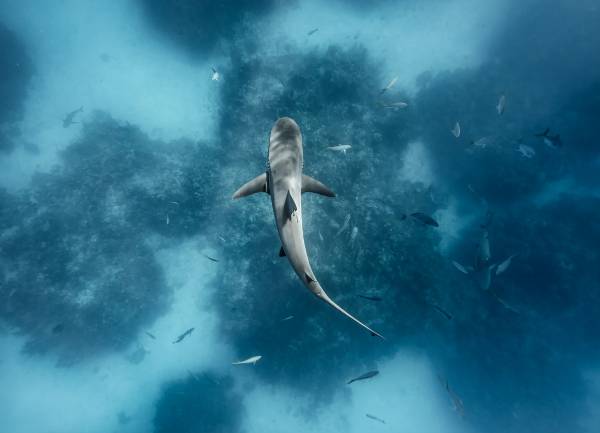Photo by Colin Ruggerio
November 6, 2020, NASSAU, BAHAMAS– The Bahamas National Trust (BNT) has taken note of the recent comments made by The Deputy Prime Minister (DPM) in the House of Assembly about sharks and turtles.
While the BNT understands the concerns expressed by fishermen about shark interactions while fishing, spearfishing, and diving, the BNT would like to remind everyone that there is no scientific research that supports an increase in shark populations in The Bahamas.
Fishing and spearfishing are acts that attract predators. With more humans increasingly going in the ocean and doing certain activities that will attract sharks, shark-human encounters will increase.
The BNT is in alignment with the DPM that more studies need to be conducted about the population of sharks and turtles in The Bahamas, likewise for all species.
Eric Carey, Executive Director, Bahamas National Trust, stated, “I reached out to the Deputy Prime Minister to get a better understanding of what he was intending to convey in his statements. While the BNT doesn’t feel it is necessary to reduce conservation measures put in place to protect sharks, we agree with The DPM that we need to conduct more studies and do a better job of engaging fishermen so that we get a clear understanding of what they are experiencing.”
The BNT would like to use this opportunity to share some critical information about sharks and the regulations governing them in The Bahamas:
- In 2011, sharks became fully protected in The Bahamas, turning the 243,000 square miles of the Bahamian archipelago into a shark sanctuary. It is illegal to catch or harm any shark in The Bahamas.
- The Bahamas is known as the Shark Diving capital of the world. It is estimated that sharks bring in around $114 million dollars every year in The Bahamas. People from around the world travel to The Bahamas to dive, film and interact with sharks.
- Sharks play a crucial role in maintaining the balance of marine life that humans benefit from, especially in The Bahamas.
- Sharks help to keep marine animal populations healthy by removing the sick and injured, and by promoting greater fish diversity and healthier coral reefs.
The BNT also notes statements made by the Deputy Prime Minister about sea turtles feeding on conch.
Green sea turtles are necessary in keeping seagrass beds healthy. Healthy seagrass beds are crucial in supporting conch populations, which feed on the algae found on seagrass. The reality is that while sea turtles do naturally feed on conch, without sea turtles, the seagrass beds crucial to the survival of conch would not be healthy, and thus conch would be in even greater trouble. So, both species depend on each other for their long-term survival. Loggerhead turtles feed on the queen conch, but only at certain life stages. The impact of sea turtles on conch populations is therefore minimal, and more importantly this is a part of maintaining nature’s balance. It is important to note that while there may have been some recovery in local populations, sea turtles remain critically endangered across their range and are some of the most endangered animals in the world.
Their importance to the culture, economy, and environment of The Bahamas is the reason why sharks and turtles were formally protected by the government.
More public education on the importance of sharks and sea turtles is needed and we have to come up with reasonable solutions to help protect both people as well as these resources that we need for our very own survival.
It is important that the government, conservation organizations, fishermen, and the public continue to work together to ensure that conservation benefits people and the environment.
About:
The Bahamas National Trust (BNT) was created by an Act of Parliament in 1959 to build and manage the national park system of The Bahamas. Possibly the only non-governmental organization in the world charged with such a responsibility, the BNT works daily to conserve and protect the natural resources of The Bahamas through stewardship and education for present and future generations. There are currently 32 National Parks managed by the BNT with more than 2 million acres of marine and terrestrial areas protected.
Media Contact:
Anna Bancroft, Bahamas National Trust
Cell. 242-424-1764 / Tel. 242-393-1317
Email: abancroft@bnt.bs